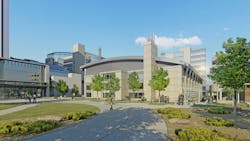CDC set to build the most advanced high containment laboratory in the country
Long before COVID-19 put the CDC front and center in news broadcasts around the country, plans to construct the most advanced High Containment Continuity Laboratory (HCCL) in the country had already been finalized.
The new, 160,000-sf facility will be part of the CDC’s 2025 Masterplan at the Roybal Campus in Atlanta. The multi-story research building will increase the CDC’s research capacity to sustain its diagnostic mission and support its public health mission by helping communities prepare for, detect, and respond to consequences of public health hazards. The HCCL building will be a Biosafety Level-4 (BSL-4) facility and accommodate approximately 80 laboratory researchers.
See Also: Georgia Tech Research Institute adds 350,000 sf of specialized tech facilities
As a BSL-4 facility, the project will feature high-efficiency particulate air filtered supply and exhaust air, air pressure resistant doors, pressure cascade zoning, effluent collection and treatment, pressure decay tested coatings and penetrations, and high purity breathing air and chemical decontamination showers for research staff. The new facility will connect with the existing Roybal Campus utility systems with below grade utility tunnels and a two-level bridge connection.
After completion, the HCCL will be one of three facilities in the world designed and certified to facilitate diagnostic research on specific, select viruses. The project is currently in the reconstruction/design phase with construction planned to begin in early 2021. Flad Architects, Page Southerland Page, and WSP will plan, program, and design the HCCL with McCarthy Building Companies as Construction Manager as constructor (CMc). HERA lead programming for the HCCL and is a part of the overall design effort.
